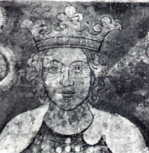(Adding categories) |
m (further) Tag: sourceedit |
||
| (One intermediate revision by one other user not shown) | |||
| Line 33: | Line 33: | ||
Jaromar's rule was dedicated to the expansion of trade. His father had arranged his marriage to one of [[Charles II of Anglia (The Kalmar Union)|Charles II]] of [[Anglia (The Kalmar Union)|Anglia's]] illegitimate daughters, Gundrada, not for a military alliance but for the right to trade freely with Anglia's booming ports. Not long after being confirmed as Viken's king the German city of Lübeck attacked Rugia, jealous of the mainland town of Stralsund's trading success. Ironically Wizlaw I had consciously copied Lübeck's charter when granting rights to merchants. The town was burnt down, leading to a four year war between Lübeck and Viken-Rugia. Lübeck's ships were captured and its sea-borne trade blockaded until the city capitulated and paid Jaromar compensation. |
Jaromar's rule was dedicated to the expansion of trade. His father had arranged his marriage to one of [[Charles II of Anglia (The Kalmar Union)|Charles II]] of [[Anglia (The Kalmar Union)|Anglia's]] illegitimate daughters, Gundrada, not for a military alliance but for the right to trade freely with Anglia's booming ports. Not long after being confirmed as Viken's king the German city of Lübeck attacked Rugia, jealous of the mainland town of Stralsund's trading success. Ironically Wizlaw I had consciously copied Lübeck's charter when granting rights to merchants. The town was burnt down, leading to a four year war between Lübeck and Viken-Rugia. Lübeck's ships were captured and its sea-borne trade blockaded until the city capitulated and paid Jaromar compensation. |
||
| − | Evidently pleased that Viken's trade was now causing consternation amongst the German trading cities he extended 'Lübeck Rights' to |
+ | Evidently pleased that Viken's trade was now causing consternation amongst the German trading cities he extended 'Lübeck Rights' to further Vikene and Rugian towns. |
In Jaromar may have been planning to attack [[Saaremaa (The Kalmar Union)|Saaremaa]] to disrupt its own trading expansion, in a joint operation with his cousin [[Cnut II of Svealand (The Kalmar Union)|Cnut II]] of [[Svealand (The Kalmar Union)|Svealand]] however domestic problems would scupper all of his plans. In the summer of 1260 a peasant revolt erupted in Viken, and whilst suppressing it Jaromar was stabbed, apparently by a peasant woman. He would be succeeded by his eldest son [[Wizlaw II of Viken (The Kalmar Union)|Wizlaw II]]. |
In Jaromar may have been planning to attack [[Saaremaa (The Kalmar Union)|Saaremaa]] to disrupt its own trading expansion, in a joint operation with his cousin [[Cnut II of Svealand (The Kalmar Union)|Cnut II]] of [[Svealand (The Kalmar Union)|Svealand]] however domestic problems would scupper all of his plans. In the summer of 1260 a peasant revolt erupted in Viken, and whilst suppressing it Jaromar was stabbed, apparently by a peasant woman. He would be succeeded by his eldest son [[Wizlaw II of Viken (The Kalmar Union)|Wizlaw II]]. |
||
| Line 39: | Line 39: | ||
{{VikenKingsKU}} |
{{VikenKingsKU}} |
||
{{KU}} |
{{KU}} |
||
| − | [[Category:Monarchs (The Kalmar Union)]] |
||
| − | [[Category:People (The Kalmar Union)]] |
||
Latest revision as of 23:59, 18 June 2015
| Jaromar | |
|---|---|

| |
| Jaromar | |
| King of Viken | |
| Reign | 23rd May, 1249 - 1st August, 1260 |
| Predecessor | Wizlaw I |
| Successor | Wizlaw II |
| Prince of Rugia (as Jaromar II) | |
| Reign | 23rd May, 1249 - 1st August, 1260 |
| Predecessor | Wizlaw I |
| Successor | Wizlaw II |
| Born | 5th April, 1220 Oslo, Viken |
| Died | 1st August, 1260 Tonsberg, Viken |
| Spouse | Gundrada of Anglia |
| Issue | Wizlaw II Jaromar |
| Full name | |
| Jaromar Wizlawsson | |
| House | Rugia |
| Father | Wizlaw I |
| Mother | Inge of Vejle |
The eldest son of Wizlaw I, Jaromar proved a steady hand for Viken's restive nobles. A firm believer in the power of trade to provide wealth for his two lands he built on his father's reforms, making Stralsund a depot for Baltic trade.
Jaromar's rule was dedicated to the expansion of trade. His father had arranged his marriage to one of Charles II of Anglia's illegitimate daughters, Gundrada, not for a military alliance but for the right to trade freely with Anglia's booming ports. Not long after being confirmed as Viken's king the German city of Lübeck attacked Rugia, jealous of the mainland town of Stralsund's trading success. Ironically Wizlaw I had consciously copied Lübeck's charter when granting rights to merchants. The town was burnt down, leading to a four year war between Lübeck and Viken-Rugia. Lübeck's ships were captured and its sea-borne trade blockaded until the city capitulated and paid Jaromar compensation.
Evidently pleased that Viken's trade was now causing consternation amongst the German trading cities he extended 'Lübeck Rights' to further Vikene and Rugian towns.
In Jaromar may have been planning to attack Saaremaa to disrupt its own trading expansion, in a joint operation with his cousin Cnut II of Svealand however domestic problems would scupper all of his plans. In the summer of 1260 a peasant revolt erupted in Viken, and whilst suppressing it Jaromar was stabbed, apparently by a peasant woman. He would be succeeded by his eldest son Wizlaw II.
| ||||||||||||||||||||||||||||
| ||||||||||||||||||||


